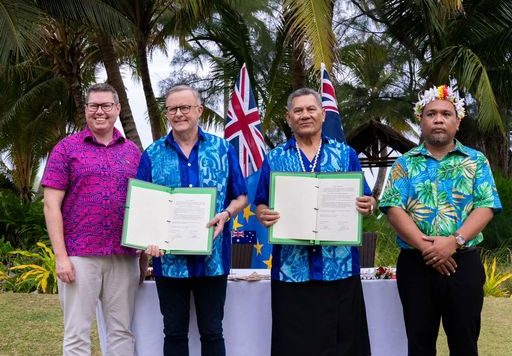Over the week of 20 November 2023, Tuvalu held its last parliamentary session under the Natano government, which was elected in 2019 and officially dissolved on 27 November. Elections for the new parliament will be held on 26 January 2024.
During the session, the Australia-Tuvalu Falepili Union was hotly debated, revealing perspectives from Tuvalu’s elected officials on the Union, the timing of its entry into force, and its potential longevity. This debate made one point very clear: the version of the Union agreement published on the website of Australia’s Department of Foreign Affairs and Trade is contested within Tuvalu and will likely not be the final.
During the debate, the parliamentary opposition raised numerous questions about the Union, including whether it had been approved by Cabinet and why it had not been submitted to consultation with the people of Tuvalu. Opposition members noted there was widespread confusion among members of the public about what the Union entailed. This was compounded by the fact that no official version of the document, in English or Tuvaluan, had been released by the government.
By the fourth day of the parliamentary session, opposition leader Enele Sopoaga raised a motion that the Union be properly ratified through a process including consultation with the public, even translating his motion into English with the hope that the Australian High Commission in Tuvalu would heed his words. The motion, ultimately defeated, proposed “that Parliament resolves to allow for the proper ratification of the Falepili Treaty, including through a referendum or show of public views, before the signed agreement is entered into force.”
Numerous members of parliament raised concerns about the language in the Union agreement as it currently stands. Simon Kofe, one of the representatives for Tuvalu’s capital Funafuti, noted positive aspects of the agreement but also questioned sections of it providing Australia with access to Tuvalu’s immigration, passport, citizenship, and border control data, which would ostensibly facilitate the establishment of a special human mobility pathway between Tuvalu and Australia as proposed under the Union.
Kofe further highlighted the geopolitics clearly at play in the Union, asking whether it was wise for Tuvalu to insert itself into the ongoing competition between China and the West by becoming party to a security agreement with Australia. Kofe implored his colleagues to recognise that Tuvalu’s security interests were very different from Australia’s, and that Tuvalu’s interests would inevitably be sacrificed if it became a strategic stronghold for Australia. He particularly criticised Article 4.4 of the Union agreement, where Tuvalu must “mutually agree” with Australia on any security or defence partnership Tuvalu hopes to enter into with any state aside from Australia, as compromising Tuvalu’s sovereignty.
In response to these critiques, Prime Minister Kausea Natano and government ministers, including the Minister of Finance Seve Paeniu, explained the Union agreement was not yet in force in either Australia or Tuvalu although it has been approved by Australia’s Cabinet. The parliament of Australia would require at least 12 months to execute the necessary legislative processes, especially with respect to changing its visa laws, that would allow for a final exchange of diplomatic notes between Tuvalu and Australia to bring the Union agreement into force.
Government members argued the spirit of the agreement was to increase Tuvalu’s preparedness in the face of the climate crisis and facilitate opportunities for Tuvaluan immigration to and employment in Australia. They insisted the wording of the Union, particularly the wording of Article 4 on security cooperation, could be negotiated and changed before the Union came into force to better protect Tuvalu’s sovereignty – but that the ideas undergirding the agreement represented a positive opportunity for Tuvalu.
What has become clear after this parliamentary session is that, from the Tuvalu side, the Union agreement as currently drafted is far from accepted and even further from implementation. Any final agreement on the Union is now for the new Tuvalu government to decide. In Tuvalu, although the executive can unilaterally ratify an agreement or treaty to bring it into force, any legislative changes required to actually implement an agreement or treaty are a matter for parliament. The composition of the new Tuvalu parliament and executive will therefore be critical for the future of the Union.
Undoubtedly, citizens’ views for or against the Union will carry some weight as they go to the polls in January 2024, and a vote returning the current government to power will signal support for the Union in its spirit if not in its details. Voters will also likely be considering the seemingly opaque manner in which the Union agreement was negotiated and the unusual way in which it was communicated to the public – through external reporting rather than information from the government.
The Australia-Tuvalu Falepili Union may have been signed by the parties, but it is far from final. Ultimately, although Sopoaga’s motion in parliament for a referendum on the Union was defeated, the upcoming elections will give the Tuvaluan public a critical opportunity to weigh in on this important issue.
Jess Marinaccio is an Assistant Professor of Asian Pacific Studies at California State University, Dominguez Hills. Marinaccio previously worked for Tuvalu’s Department of Foreign Affairs and was a member of the Secretariat for Tuvalu’s Constitutional Review Parliamentary Select Committee.
The opinions expressed in this article are those of the author and do not necessarily reflect the opinions of this publication.
